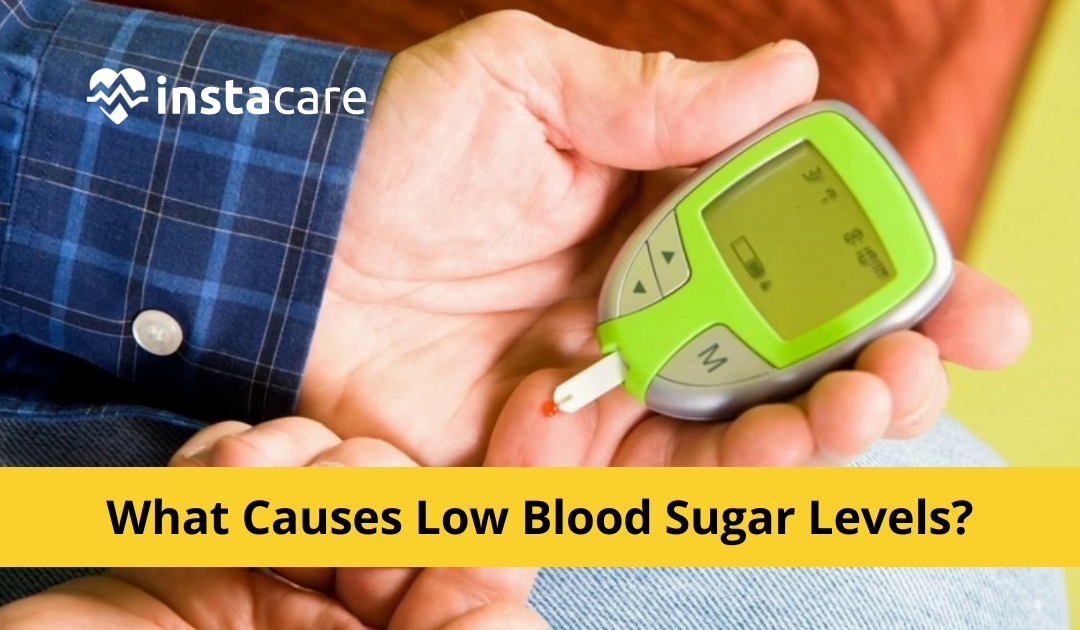Throughout the day, blood sugar levels frequently shift. A person is said to have low blood sugar when their levels go below 70 mg/dL. You must take action to raise it from this point. People with type 1 diabetes experience low blood sugar more frequently than others.
It's critical to know how to recognize low blood sugar since, if addressed, it can be hazardous. Learn more about the signs and causes of low blood sugar.
Low Blood Sugar Causes
You could have low blood sugar for a variety of reasons, including:
- Taking much insulin
- Not consuming enough carbohydrates for your insulin dosage
- Timing of insulin administration
- Physical activity duration and intensity
- Consuming alcohol
- The quantity of protein, fiber, and fat in your meal
- Humid and warm conditions
- Unforeseen adjustments to your schedule
- Time spent at a high altitude
- Undergoing puberty
- Menstruation
Low Blood Sugar Symptoms
It's possible that your response to low blood sugar won't be the same as another person's. It's critical to understand your symptoms. Typical signs might include:
- Rapid heart rate
- Shaking
- Sweating
- Anxiety or jitters
- Intolerance or confusion
- Dizziness
- Hunger
Low blood sugar may not cause any symptoms for you (hypoglycemia unawareness). It will be more difficult to detect and treat low blood sugar early if you don't have any symptoms. This can be hazardous and raise your risk of experiencing very low lows. If any of the following apply to you:
- Longer than five to ten years with diabetes.
- Having low blood sugar a lot.
- Consider taking specific medications, such as beta blockers for high blood pressure.
You might need to check your blood sugar more frequently to see if it's low if you have hypoglycemia unawareness and one or more of the aforementioned symptoms. It is crucial to do this before driving or engaging in strenuous activity.
View More: How To Lower Blood Sugar Quickly At Home 10 Easy Ways
?
Low Blood Sugar From Not Eating
Malnutrition and famine can cause hypoglycemia because when you don't eat enough, your body uses up the glycogen stores it requires to produce glucose. One condition that can result in hypoglycemia and long-term malnutrition is an eating disorder termed anorexia nervosa.
Ignorance Of Hypoglycemia
Hypoglycemia unawareness can develop over time as a result of recurrent hypoglycemic episodes. Low blood sugar warning signs and symptoms like trembling or irregular heartbeats are no longer produced by the body or brain (palpitations). The possibility of severe, potentially fatal hypoglycemia rises when this occurs.
Your healthcare practitioner may change your therapy, raise your blood sugar level objectives, and suggest blood glucose awareness training if you have diabetes, recurrent hypoglycemia, and hypoglycemia unawareness.
Some patients with hypoglycemia unawareness can use a continuous glucose monitor (CGM). Your blood sugar can be too low and the device can warn you of it.
Untreated Diabetes
Episodes of low blood sugar are unpleasant and even terrifying if you have diabetes. You may take less insulin out of fear of hypoglycemia to prevent your blood sugar from dropping too low. This may cause diabetes to become unmanageable. Discuss your fears with your doctor, and don't alter the dosage of your diabetes medication without first consulting him or her.
Avoidance If You Have Diabetes
- Observe the diabetes control strategy that you and your doctor have created. The treatment of your diabetes and your risk of low blood sugar may be affected if you start taking new medications, alter your eating or medication schedules, or start doing more activity. Discuss these adjustments with your health care provider.
- Find out the warning signs and symptoms of low blood sugar. This can assist you in spotting hypoglycemia and treating it before it becomes too severe. You can detect whether your blood sugar is getting low by often monitoring it.
- Always keep a fast-acting carbohydrate on hand, such as hard candies, juice, or glucose pills, to address a dropping blood sugar level before it reaches dangerously low levels.
If You Don’t Have Diabetes
Eating numerous little meals frequently throughout the day is a temporary solution for recurrent episodes of hypoglycemia to help keep blood sugar levels from falling too low. However, as a long-term plan, this course of action is not suggested. Find the source of your hypoglycemia and treat it in collaboration with your healthcare physician.
When To Visit A Doctor
Immediately seek medical attention if:
- You might have signs of hypoglycemia, but you don't have diabetes.
- You have diabetes, and despite trying to manage your hypoglycemia by drinking juice or regular (not diet) soft drinks, eating candy, or taking glucose tablets, nothing seems to work.
- If you have diabetes or a history of hypoglycemia and you experience severe hypoglycemia symptoms or you become unconscious, you should seek emergency medical attention.
What To Eat When Blood Sugar Is Low?
When your blood sugar is low, it's important to eat something quickly in order to prevent symptoms from worsening. Good foods to eat include:
- Fruit juice.
- Glucose tablets or gels.
- Hard candies or lollipops containing sugar.
- Non-diet soda.
- Table sugar dissolved in water.
- Honey or corn syrup.
- Whole grain crackers with cheese or peanut butter.
Conclusion
When the amount of sugar (glucose) in your blood falls too low, the condition is known as low blood sugar, commonly referred to as hypoglycaemia or a "hypo"
It primarily affects diabetics, particularly if they use insulin.
If not addressed right away, low blood sugar can be harmful, but you can generally take care of it on your own.
Please book an appointment with the Best Diabetologist in Lahore, Karachi, Islamabad, and all major cities of Pakistan through InstaCare, or call our helpline at 03100002273 to find a verified doctor for your disease.
Source: https://instacare.pk/blog/what-causes-low-blood-sugar-levels








